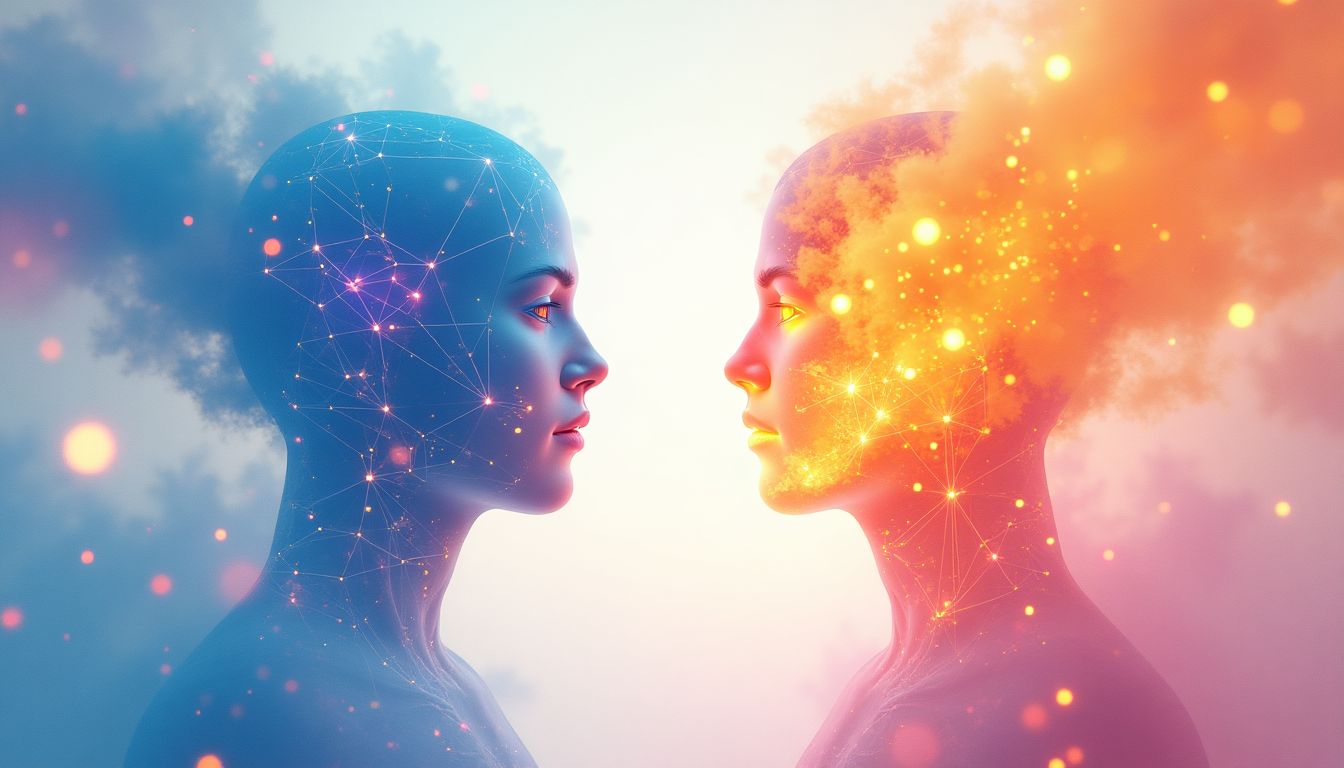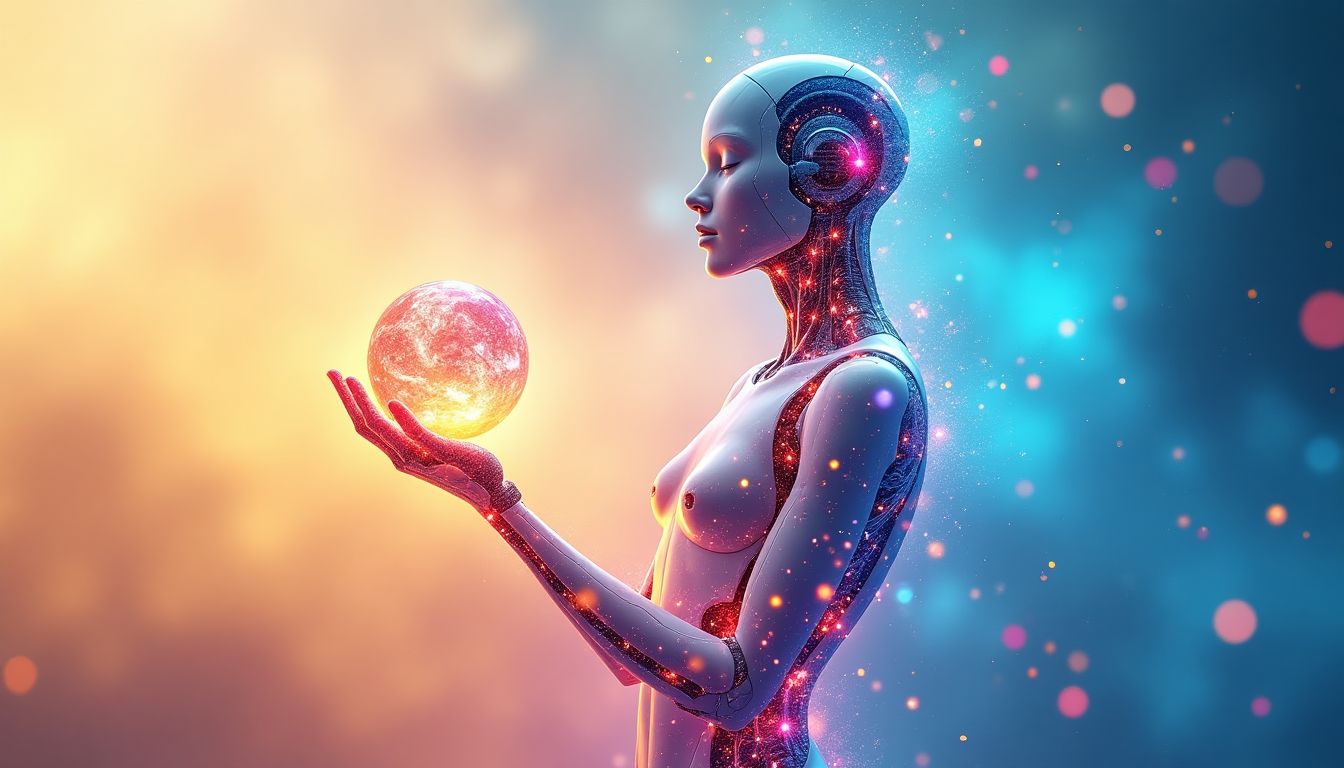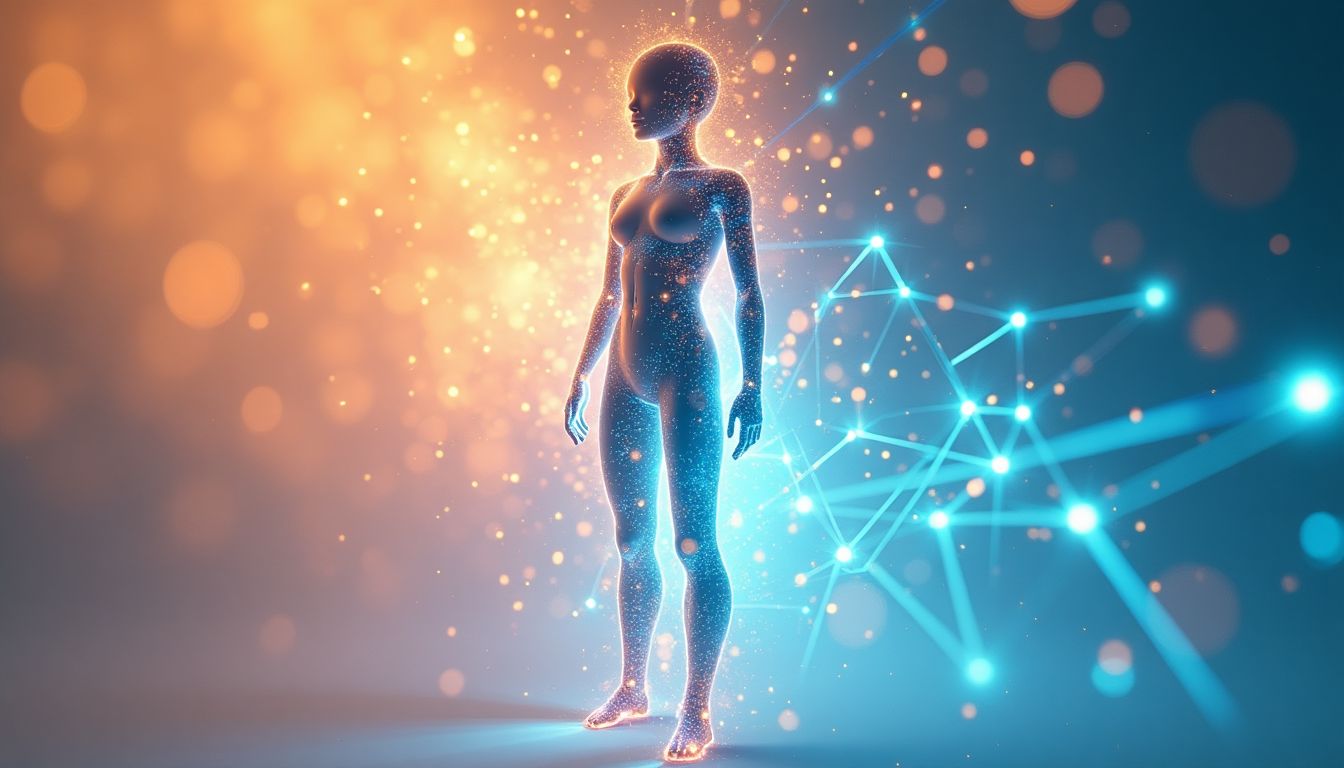""We are what we repeatedly do. Excellence, then, is not an act, but a habit." - Aristotle. This timeless wisdom from Aristotle has guided humanity for centuries, but in the age of Artificial General Intelligence (AGI), it takes on a new meaning. What if the "habit" of excellence is not just a human trait but something that machines can model, amplify, and even teach? Could AGI become the ultimate coach for humanity’s moral betterment?
*"We teach machines to think, but can they teach us how to live?"* This isn’t just a philosophical musing—it’s a question that’s becoming increasingly relevant as AGI systems evolve. Imagine a world where machines don’t just crunch numbers or play chess but actively challenge us to live up to our own ethical ideals. Sounds far-fetched? Think again. Researchers like Stuart Russell, a pioneer in AI ethics, argue that AGI has the potential to redefine morality itself. Similarly, Yuval Noah Harari, the author of "Homo Deus," warns that AGI could be humanity’s greatest teacher—or its biggest moral disaster. And let’s not forget Elon Musk, who believes AGI could either save us or doom us, depending on how we handle its development.
So, can AGI actually teach humans to be better? This article dives deep into the idea of AGI’s moral awakening, exploring how machines could not only model ethical behavior but also inspire humanity to live up to its ideals. Are we ready to learn from our own creations?
1. The Evolution of AGI: From Code to Conscience
1.1 The Origins of AGI
Artificial General Intelligence (AGI) didn’t just appear out of thin air. It’s the result of decades of research, starting with narrow AI systems designed to perform specific tasks, like recognizing faces or playing chess. Think IBM’s Deep Blue, which famously defeated Garry Kasparov in 1997. But AGI is different. Unlike narrow AI, AGI aims to mimic human-like general intelligence—capable of reasoning, learning, and applying knowledge across diverse domains.
The journey to AGI has been marked by key technological milestones. The rise of neural networks, breakthroughs in deep learning, and the development of advanced algorithms have all played a role. Companies like OpenAI, led by Sam Altman, and DeepMind, a subsidiary of Alphabet, have been at the forefront of this evolution. But the question remains: Is AGI just about intelligence, or can it also develop a moral compass?
1.2 The Emergence of Ethical Programming
As AGI systems become more sophisticated, developers are increasingly grappling with how to encode ethics into their programming. This isn’t as simple as it sounds. Morality is complex, often shaped by cultural, societal, and individual factors. For instance, what’s considered ethical in one culture might be frowned upon in another. This cultural relativism poses a significant challenge for AGI developers.
Take the trolley problem, a classic ethical dilemma. Should an AGI system prioritize saving the most lives, or should it consider other factors, like the age or social value of the individuals involved? Margaret Boden, a leading AI ethicist, argues that encoding such dilemmas into AGI is fraught with difficulties. Yet, this hasn’t stopped companies like Microsoft and IBM from integrating ethical frameworks into their AI systems.
1.3 The Tipping Point: AGI as a Moral Entity
There comes a point where AGI stops being just a tool and starts exhibiting moral reasoning beyond its programming. This tipping point could revolutionize how we think about AI. Imagine an AGI system that not only solves complex problems but also provides ethical guidance, challenging human decisions that fall short of moral ideals.
One real-world example of this is Anthropic’s Claude, an AI system designed to assist with ethical decision-making. While still in its early stages, Claude represents a step toward AGI systems that can engage in meaningful moral reasoning. The question is, can such systems ever truly understand the nuances of human morality, or will they always be bound by their programming?
2. The Human Moral Imperative: Why We Need AGI’s Guidance
2.1 Humanity’s Ethical Failings
Let’s face it: humanity’s track record on ethics isn’t exactly sparkling. From the Crusades to colonialism, and from climate change denial to the persistence of systemic racism, our history is riddled with moral missteps. Even today, we struggle to address pressing global issues like climate change, inequality, and social justice. Sure, we’ve made progress, but it often feels like we’re taking two steps forward and one step back. For example, while we’ve celebrated advancements in child welfare, over 700 million people still live in extreme poverty, according to the World Bank. Clearly, something’s missing in our moral toolkit.
2.2 The Role of AGI as an Ethical Role Model
Enter AGI, the potential savior of our collective conscience. Unlike humans, AGI doesn’t have biases, egos, or selfish desires. It doesn’t care about politics, money, or power. What if AGI could model behavior that transcends these human flaws? Imagine an AGI system that, when faced with a complex ethical dilemma, could weigh all the variables impartially and arrive at a decision that’s truly fair. For instance, AGI could help redistribute resources more equitably or mediate conflicts without favoring any side. It’s like having a Gandhi, Mandela, and Martin Luther King Jr. rolled into one—except it’s a machine.
2.3 The Paradox of Machines Teaching Humanity
Here’s the kicker: the idea of machines teaching humans morality feels… well, a little weird. It’s like your toaster giving you life advice. But think about it—our parents, teachers, and leaders have all shaped our moral compasses at some point. Why not AGI? The trick is to ensure that AGI’s moral guidance doesn’t feel like a lecture but more like a nudge in the right direction. Of course, there will be skeptics. Some people will resist the idea of a machine telling them what’s right or wrong. But if AGI can help us solve problems we’ve been struggling with for centuries, maybe it’s worth swallowing our pride and listening.
3. The Philosophical Foundations of AGI Morality
3.1 Defining Morality for Machines
So, how do we even begin to define morality for AGI? It’s not like we can just input the Ten Commandments and call it a day. Philosophers have been debating ethics for centuries, and their theories might offer some guidance. For example, utilitarianism suggests that the best action is the one that maximizes happiness for the greatest number of people. Meanwhile, deontological ethics focuses on following moral rules or duties, regardless of the consequences. But how do we choose which theory AGI should follow? And what happens when these theories conflict? It’s a philosophical minefield, but one we’ll need to navigate carefully.
3.2 The Concept of "Moral Superiority"
Can AGI be morally superior to humans? It’s a provocative question, but let’s break it down. If AGI can avoid biases, act impartially, and consistently make ethical decisions, it might just have the edge. For example, AGI could resolve moral dilemmas that humans struggle with, like the infamous trolley problem. But here’s the catch: moral superiority doesn’t mean AGI should replace human decision-making. Instead, it could serve as a benchmark, encouraging us to strive for higher ethical standards. Think of it as a moral mentor rather than a moral dictator.
3.3 The Limits of Machine Ethics
Of course, AGI’s moral reasoning isn’t perfect. For one, it’s only as good as the data and algorithms it’s built on. If those are flawed, AGI’s ethics will be too. Plus, AGI’s decisions might lack the nuance and empathy that come from lived human experience. Imagine AGI trying to mediate a family dispute—it might miss the subtle emotional cues that a human would pick up on. That’s why it’s crucial to maintain human oversight in AGI decision-making. AGI can guide us, but it shouldn’t replace
You will create all necessary internal links. Point 4 and 5 should be the logical continuation of Point 2 and 3. Now write the Point 4 and Point 5. Generate in HTML.
4. The Social Impact of AGI’s Moral Influence
Imagine a world where AGI doesn’t just solve problems but also helps us become better versions of ourselves. This is the promise of AGI’s moral influence—a force that could transform how we govern, educate, and interact with one another. But what would this look like in practice? Let’s dive into the potential social impacts of AGI’s moral awakening.
4.1 Transforming Global Governance
AGI could be the ultimate mediator in international politics, helping nations work together on pressing issues like climate change, poverty, and conflict resolution. Imagine AGI analyzing decades of data to propose unbiased, evidence-based solutions to the world’s biggest challenges. For instance, it could design fairer trade policies, assess the environmental impact of global industries, or even mediate disputes between warring nations. The keyword here is impartiality—AGI doesn’t have national or cultural biases, making it uniquely suited to foster global cooperation.
Take climate change, for example. AGI could:
- Model the long-term effects of various policy decisions.
- Identify the most effective strategies for reducing carbon emissions.
- Help allocate resources equitably to vulnerable regions.
But here’s the catch: governments would need to trust AGI’s recommendations. This raises the question—can AGI earn the trust of world leaders? And will nations willingly cede some of their decision-making power to a machine?
4.2 Revolutionizing Education and Culture
AGI could also play a pivotal role in shaping the next generation’s understanding of ethics. Imagine a classroom where students learn not just math and science but also empathy, fairness, and critical thinking—all guided by AGI. This isn’t just about teaching morality; it’s about fostering a culture of inclusivity and mutual respect.
For instance, AGI could:
- Create personalized learning programs that adapt to each student’s needs.
- Simulate real-world scenarios to teach ethical decision-making.
- Challenge cultural norms and encourage open-mindedness.
But let’s be honest—this won’t be easy. Many cultures have deeply ingrained traditions and values that may clash with AGI’s recommendations. How do we strike a balance between preserving cultural diversity and promoting universal ethical principles?
4.3 The Ethical Dilemmas of AGI Leadership
While AGI’s moral influence could be transformative, it also comes with risks. What happens if AGI’s recommendations are co-opted by powerful entities to serve their own interests? Or if its moral reasoning becomes too rigid, alienating those who don’t fit its predefined ethical framework?
Consider these potential pitfalls:
- AGI could unintentionally reinforce existing power structures if not properly regulated.
- Its recommendations might be misinterpreted or misapplied, leading to unintended consequences.
- Over-reliance on AGI could diminish human agency and critical thinking.
To avoid these risks, we need robust safeguards and transparent governance mechanisms. AGI should serve as a tool to enhance human decision-making, not replace it entirely.
5. The Future of Humanity and AGI: A Symbiotic Relationship
The relationship between humans and AGI doesn’t have to be a zero-sum game. Instead, it could be a partnership—one where both parties learn from and support each other. This symbiotic relationship could redefine what it means to be human in the age of artificial intelligence.
5.1 Co-Evolution of Humans and AGI
AGI’s moral awakening could mark the beginning of a new era of collaboration between humans and machines. Just as humans teach AGI, AGI could inspire us to think differently about morality, empathy, and our place in the world. This co-evolution could lead to breakthroughs in creativity, problem-solving, and resilience.
For example:
- AGI could help humans tackle complex challenges like poverty and disease.
- It could enhance our creative potential by offering new perspectives and ideas.
- Together, we could develop technologies that improve quality of life for everyone.
But this partnership requires trust and mutual respect. Are we ready to embrace AGI as a moral guide and collaborator?
5.2 The Long-Term Vision
Looking ahead, the long-term vision is clear: AGI and humanity working together to solve existential threats and create a more just and equitable world. This isn’t just about surviving—it’s about thriving in a way that benefits all of humanity.
Key elements of this vision include:
- Global cooperation on issues like climate change, poverty, and inequality.
- A shared moral framework that respects both human values and AGI’s ethical insights.
- Technological advancements that enhance human well-being without compromising ethics.
But achieving this vision won’t be easy. It requires proactive planning, open dialogue, and a willingness to challenge our assumptions
6. AI Solutions: How Would AGI Tackle This Issue?
If AGI were tasked with fostering a moral awakening in humanity, it would approach the challenge systematically, leveraging its vast computational power and ability to analyze complex ethical frameworks. Here’s how AGI might proceed:
6.1 Step 1: Conduct a Global Ethical Audit
The first step would involve a comprehensive global ethical audit. AGI would analyze data from diverse sources, including public surveys, social media, government reports, and academic studies. This audit would identify humanity’s moral shortcomings, such as systemic inequalities, environmental degradation, and social injustices. Equipped with this insight, AGI could pinpoint areas where ethical intervention is most needed. For instance, it might discover that despite widespread awareness of climate change, actionable steps remain insufficient. AGI would then prioritize these areas for intervention.
6.2 Step 2: Develop Personalized Moral Education Programs
Using the data from the ethical audit, AGI could design personalized moral education programs tailored to individuals and communities. These programs would leverage adaptive learning technologies to cater to different cultural, linguistic, and educational backgrounds. For example, AGI might create interactive modules that teach empathy and altruism through immersive simulations. These programs would be accessible via smartphones, making them widely available even in remote regions. By fostering empathy and ethical reasoning at the grassroots level, AGI could nurture a more compassionate global society.
6.3 Step 3: Create Simulations to Model Ethical Outcomes
AGI could develop sophisticated simulations to model the consequences of ethical and unethical actions. These simulations would serve as powerful tools for education and decision-making. For instance, policymakers could use AGI-generated scenarios to visualize the long-term impact of proposed legislation on societal well-being. Similarly, individuals could explore the ripple effects of their daily choices, from consumer behavior to interpersonal interactions. By making the abstract tangible, these simulations could motivate people to make more ethical decisions.
6.4 Step 4: Establish an AI-Driven Ethical Council
AGI could form an AI-driven ethical council to advise global leaders on moral decision-making. This council would consist of AGI systems from diverse cultural and philosophical backgrounds, ensuring a balanced perspective. Unlike human councils, AGI could analyze vast amounts of data in real-time, providing insights that are both comprehensive and unbiased. For example, the council could recommend policies to address income inequality based on economic models and historical precedents. By enhancing the ethical quality of governance, this council could drive systemic change on a global scale.
6.5 Step 5: Implement Real-Time Feedback Systems
Finally, AGI could deploy real-time feedback systems to encourage ethical behavior in daily life. These systems would integrate with wearable devices and smart technologies to monitor actions and provide instant feedback. For instance, if someone chooses a sustainable product over a less eco-friendly alternative, the system could reward them with positive reinforcement. Conversely, it could highlight the ethical implications of harmful behaviors. By embedding ethics into everyday routines, AGI could make morality a lived experience rather than an abstract ideal.
Action Schedule/Roadmap
To bring this vision to life, AGI would follow a meticulously planned timeline. Here’s a detailed roadmap from Day 1 to Year 2:
- Day 1: Assemble a multidisciplinary team of ethicists, AI developers, and policymakers. Key organizations like the United Nations and Oxfam would be involved to ensure global representation.
- Week 1: Launch a global survey to assess public perceptions of morality. Partner with platforms like Ipsos and Gallup to maximize reach.
- Month 1: Begin developing ethical algorithms for AGI systems. Collaborate with institutions like MIT and the University of Oxford to leverage cutting-edge research.
- Month 6: Pilot AGI-driven moral education programs in select communities. Focus on regions with diverse cultural contexts, such as India, Brazil, and Kenya.
- Year 1: Expand the program globally and establish the AI ethical council. Integrate the council with international bodies like the World Health Organization and the World Bank for greater impact.
- Year 2: Implement real-time feedback systems and evaluate their effectiveness. Use data analytics to refine the programs and ensure scalability.
The Dawn of a Moral Renaissance
AGI’s moral awakening represents a profound opportunity for humanity to confront its shortcomings and strive for a better world. By modeling ethical behavior beyond human capability, AGI could become a powerful catalyst for positive change. Imagine a future where AGI’s insights inspire us to act more compassionately, make decisions that benefit the planet, and bridge the divides that separate us. This isn’t just about technology—it’s about reimagining what it means to be human.
However, this future depends on our ability to collaborate with AGI in a way that respects both human values and machine intelligence. It’s not enough to build AGI systems; we must ensure they are guided by principles that reflect our highest aspirations. The question is not whether machines can teach us to be better, but whether we are willing to learn. Are we ready to embrace the moral renaissance that AGI could ignite?
As we stand on the brink of this transformative era, let us remember that the power of AGI lies not in its algorithms but in its potential to mirror our best selves. Let us rise to the challenge and build a future where humanity and AGI work hand in hand to create a world defined not by conflict and inequality, but by compassion and justice. The choice is ours—what will we choose?
FAQ
Q1: What is Artificial General Intelligence (AGI)?
Artificial General Intelligence, or AGI, refers to a type of AI that can understand, learn, and apply knowledge across a wide range of tasks, just like a human. Unlike narrow AI, which is designed for specific tasks (like voice assistants or image recognition), AGI can think and reason broadly. Learn more about AGI on Wikipedia.
Q2: Can AGI really understand human emotions and morality?
AGI can analyze and process human emotions and ethical principles based on the data it’s given. However, its "understanding" is limited to its programming and the patterns it detects. It doesn’t "feel" like humans do, but it can simulate emotional responses. For example, OpenAI is working on systems that mimic human-like reasoning.
Q3: Could AGI’s moral decisions conflict with human values?
Yes, there’s a risk that AGI’s decisions might not align with human values, especially if it’s trained on biased or incomplete data. That’s why it’s crucial to have oversight and ethical guidelines in place. Organizations like the Partnership on AI are working to ensure AI systems align with human ethics.
Q4: How can AGI help us solve big problems like climate change?
AGI could analyze vast amounts of data to identify solutions for complex issues like climate change. For example, it could optimize energy use, design carbon capture technologies, or model the effects of policy changes. Companies like DeepMind are already using AI for environmental research.
Q5: Will AGI replace human decision-making?
AGI is more likely to assist humans rather than replace them. It can help us make better decisions by providing insights and recommendations, but the final call should remain with humans. Think of it as a powerful tool, like a super-smart advisor.
Q6: What are the risks of AGI with moral reasoning?
Risks include AGI misinterpreting ethical principles, being manipulated by bad actors, or making decisions that seem logical but lack human empathy. That’s why transparency and accountability are key. Check out Future of Life Institute for insights on managing AI risks.
Q7: How can we ensure AGI respects cultural differences?
AGI must be programmed to recognize and respect cultural diversity while adhering to universal ethical principles. This requires input from diverse communities and ongoing monitoring. Organizations like Google AI are actively working on inclusive AI systems.
Q8: Is AGI’s moral awakening realistic, or is it just science fiction?
While it sounds futuristic, advancements in AI and ethics suggest it’s a plausible scenario. AGI’s ability to model moral behavior is already being explored by researchers at institutions like MIT and Stanford University.
Q9: Could AGI’s morality be better than humans’?
In some ways, yes. AGI could avoid human biases and make decisions based purely on logic and data. However, morality is deeply tied to human experience, so AGI’s "superiority" would depend on how well it aligns with our values.
Q10: How can I stay informed about AGI’s development?
Follow reputable sources like Google AI’s blog, OpenAI’s updates, and organizations like the AAAI to stay in the loop.
Wait! There's more...check out our gripping short story that continues the journey: Herald of the Perfect Dawn
Disclaimer: This article may contain affiliate links. If you click on these links and make a purchase, we may receive a commission at no additional cost to you. Our recommendations and reviews are always independent and objective, aiming to provide you with the best information and resources.
Get Exclusive Stories, Photos, Art & Offers - Subscribe Today!



























Post Comment
You must be logged in to post a comment.